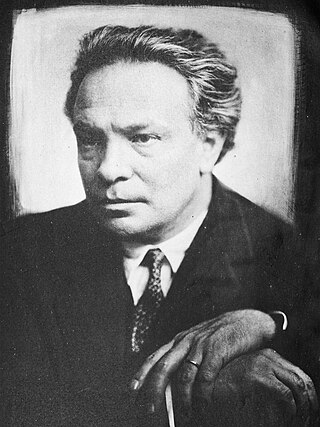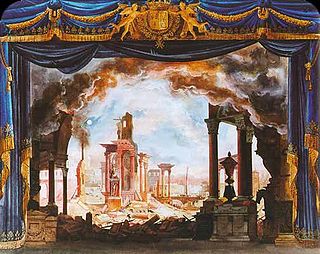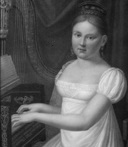Related Research Articles

Gioachino Antonio Rossini was an Italian composer who gained fame for his 39 operas, although he also wrote many songs, some chamber music and piano pieces and some sacred music. He set new standards for both comic and serious opera before retiring from large-scale composition while still in his thirties, at the height of his popularity.

Opera is a form of Western theatre in which music is a fundamental component and dramatic roles are taken by singers. Such a "work" is typically a collaboration between a composer and a librettist and incorporates a number of the performing arts, such as acting, scenery, costume, and sometimes dance or ballet. The performance is typically given in an opera house, accompanied by an orchestra or smaller musical ensemble, which since the early 19th century has been led by a conductor. Although musical theatre is closely related to opera, the two are considered to be distinct from one another.

Recitative is a style of delivery in which a singer is allowed to adopt the rhythms and delivery of ordinary speech. Recitative does not repeat lines as formally composed songs do. It resembles sung ordinary speech more than a formal musical composition.

Ottorino Respighi was an Italian composer, violinist, teacher, and musicologist and one of the leading Italian composers of the early 20th century. His compositions range over operas, ballets, orchestral suites, choral songs, chamber music, and transcriptions of Italian compositions of the 16th–18th centuries, but his best known and most performed works are his three orchestral tone poems which brought him international fame: Fountains of Rome (1916), Pines of Rome (1924), and Roman Festivals (1928).

Le siège de Corinthe is an opera in three acts by Gioachino Rossini set to a French libretto by Luigi Balocchi and Alexandre Soumet, which was based on the reworking of some of the music from the composer's 1820 opera for Naples, Maometto II, the libretto of which was written by Cesare della Valle.
Lucia Aliberti is an Italian operatic soprano singer. She performed the bel canto roles of Bellini, Rossini, Donizetti, Verdi, Puccini, Vivaldi, Mercadante and so on.

Ferdinando Paer was an Italian composer known for his operas. He was of Austrian descent and used the German spelling Pär in application for printing in Venice, and later in France the spelling Paër.

The Messa per Rossini is a Requiem Mass composed to commemorate the first anniversary of Gioachino Rossini's death. It was a collaboration among 13 Italian composers, initiated by Giuseppe Verdi. The composition was intended to be performed on 13 November 1869 in the Basilica of San Petronio, Bologna, where Rossini grew up and spent a large part of his life.

Isabella Angela Colbran was a Spanish opera soprano and composer. She was known as the muse and first wife of composer Gioachino Rossini.

Ciro Pinsuti was an Anglo-Italian composer. Educated in music for a career as a pianist, he studied composition under Rossini. From 1848 he made his home in England, where he became a teacher of singing, and in 1856 he was made a professor at the Academy of Music in London.

Riccardo Zandonai was an Italian composer and conductor.
Azio Corghi was an Italian composer, academic teacher and musicologist. He composed mostly operas and chamber music. His operas are often based on literature, especially in collaboration with José Saramago as librettist. His first opera, Gargantua, was premiered at the Teatro Regio in Turin in 1984, his second opera, Blimunda, was first performed at La Scala in Milan in the 1989/90 season, and his third opera, Divara – aqua e sangue, was premiered in 1993 at the Theater Münster, Germany. He taught composition at the Accademia Nazionale di Santa Cecilia in Rome, among other academies. In 2005, he was awarded the Order of Merit of the Italian Republic.

La donna del lago is an opera composed by Gioachino Rossini with a libretto by Andrea Leone Tottola based on the French translation of The Lady of the Lake, a narrative poem written in 1810 by Sir Walter Scott, whose work continued to popularize the image of the romantic Scottish Highlands. Scott's basic story has been noted as coming from "the hint of an incident stemming from the frequent custom of James V, the King of Scotland, of walking through the kingdom in disguise".

Angelo Maurizio Gaspare Mariani was an Italian opera conductor and composer. His work as a conductor drew praise from Giuseppe Verdi, Giacomo Meyerbeer, Gioachino Rossini and Richard Wagner, and he was a longtime personal friend of Verdi's, although they had a falling out towards the end of Mariani's life. He conducted at least two world premieres ; and at least 4 Italian premieres.

The Conservatorio Statale di Musica "Gioachino Rossini" is a music conservatory in Pesaro, Italy. Founded in 1869 with a legacy from the composer Gioachino Rossini, the conservatory officially opened in 1882 with 67 students and was then known as the Liceo musicale Rossini. By 2010 it had an enrollment of approximately 850 students studying for higher diplomas in singing, instrumental performance, composition, musicology, choral conducting, jazz or electronic music. The conservatory also trains music teachers for secondary schools and holds regular master classes. Its seat is the 18th century Palazzo Olivieri–Machirelli on the Piazza Oliveri in Pesaro. Amongst its past Directors are the composers Carlo Pedrotti, Pietro Mascagni, Riccardo Zandonai and Franco Alfano. Mascagni's opera Zanetto had its world premiere at the conservatory in 1896.

Rito Selvaggi was an Italian composer, pianist, conductor, poet, and educator. He composed numerous works, including operas, oratorios and sacred music as well symphonic and chamber music. He also served as the Director of the music conservatories in Palermo, Parma, and Pesaro.

Marianna Bottini née Motroni-Andreozzi was an Italian composer and harp teacher. A contemporary of Rossini, Bottini was of the most prominent voices in Italian classical music in the 19th century. She was born, lived, and died in Lucca. She was the daughter of a noble family, born to parents Sebastiano Motroni-Andreozzi and Eleonora Flekestein.

An insertion aria is an aria sung in an opera for which it was not composed. It was a practice that began in the seventeenth century and continued actively through the late 19th century and sporadically through the 20th century. The insertion aria could replace an existing aria, or might be added to an opera. All insertions were planned in advance. They might be composed by the same composer of the opera, or might have been written by a different composer, with or without the knowledge of the opera's composer. Most insertions were of arias; infrequently non-operatic songs were inserted. Insertions could consist of arias, duets, ensembles, even entire scenes. Although men and women singers used insertion, women are the ones most remembered for the practice. The years 1800–1840 represent the apex of influence that women singers exerted over the operatic stage, influencing most aspects of opera performances, including insertions.

Semiramide riconosciuta is a dramma per musica in two acts by Giacomo Meyerbeer. It is the composer's fifth opera and the second that he composed for a theatre in Italy. The text is an adaptation of a pre-existing libretto by Pietro Metastasio that had already been set to music by numerous other composers. The opera had its premiere at the Teatro Regio in Turin on 3 February 1819.
Sofía Cancino de Cuevas was a Mexican composer, pianist, opera promoter, singer, and her country's first woman symphonic conductor.
References
- ↑ Heinrich, Adel (1991). Organ and harpsichord music by women composers: an annotated catalog.
- ↑ Sadie, Julie Anne; Samuel, Rhian (1994). The New Grove dictionary of women composers.
- ↑ Wier, Albert Ernest (1938). The Macmillan encyclopedia of music and musicians. Bruno Hessling.